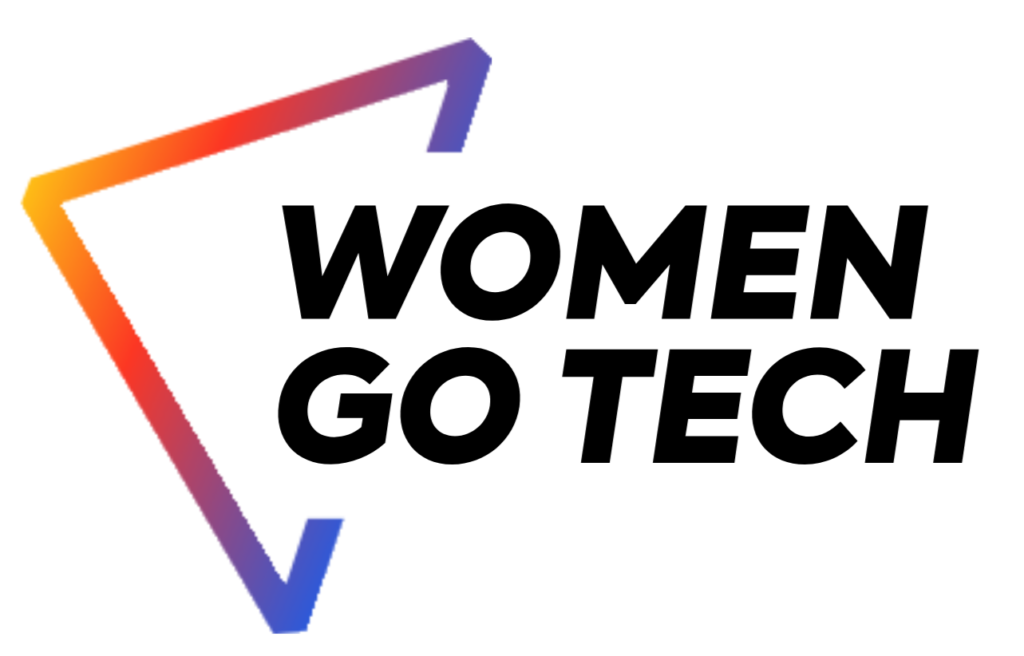By Milda Jokubaitė
The tech industry faces a talent shortage, with an estimated 85 million unfilled positions by 2030. One contributing factor is the underrepresentation of women, who currently comprise only 22% of Europe’s tech workforce and 34.4% of the largest US tech companies. However, at Nord Security, we’re happy to be above the industry standard, with nearly 40% of our colleagues being women. Meet four exceptional women in our community – Toma Jonuškaitė, Rima Miselytė, Gintarė Kučiauskienė, and Sigita Jurkynaitė – who are making significant contributions to the industry and shaping our cyber future.

The myth-busting truth about women in tech
In the 1840s, a mathematician and writer, Ada Lovelace, drafted the first computer algorithm, unknowingly paving the way for the future of technology. Recognized as the world’s first computer programmer, she shattered stereotypes and demonstrated that women can excel in tech alongside men.
Despite their proven capability in tech, not all see themselves fitting into this male-dominated industry. “People often assume that an engineer or a developer is usually a male. In truth, women can also thrive in these roles,” notes Toma Jonuškaitė, Employer Brand Manager at Nord Security.
Tech – not just for men
“Our NordSwitch program is a prime example,” she says. “Out of 600 applicants, we selected 21. Surprisingly, even 13 of them were women making bold career switches. One shifted from being a professional harpist to an Engineer, and another transitioned from teaching English in South Korea and Lithuania to becoming a Junior Data Engineer.”
Despite the big underrepresentation of women still in the tech industry, a wave of change is happening. Deloitte’s findings reveal that from 2019 to 2022, women’s participation in tech saw an 11.7% surge in technical roles. The rise in women in leadership roles is even more encouraging, soaring by nearly 20%. This trend signals a brighter and more inclusive future for tech, inspiring more women to join and thrive in this dynamic field.
Tech is not (all) rocket science
Tech jobs, including cybersecurity, are challenging due to the rapidly evolving nature of the industry and the complexity of the systems involved. However difficulty varies with personal aptitude and interests.
Gintarė Kučiauskienė, a champion for diversity at Nord Security, holds the role of Product Owner at our flagship service, NordVPN. Though her position is technical, Gintarė explains that with foundational tech knowledge, strong analytical thinking, problem-solving, time management, and communication skills, the Product Owner role is well-suited to women who want to thrive in tech.
As a Product Owner, her responsibilities involve overseeing team deliverables and ensuring the product’s quality, monitoring user engagement and satisfaction, and compliance with legal standards. Additionally, she inspects the product for vulnerabilities or security flaws.
Summarizing her experience, Gintarė emphasizes her role’s complexity and demands: “The PO role indeed requires juggling many tasks simultaneously, but with a bit of knowledge in the field, it’s manageable. Although we develop techy stuff at Nord Security, it’s not NASA, and we’re not building a rocket. If I can thrive here, any woman can,” she encourages.
Rima Miselytė, Solutions Architect at NordPass and NordLocker, also supports the statement, saying that it’s just a stereotype that tech is complex and advanced.
“In some ways, the tech industry can be similar to other highly advancing branches, like medicine. Looks scary from the outside, but if you’re curious, open-minded, and willing to learn from others, you can crack this field like a nut.”
As a Solutions Architect, she assists engineering teams in discussing, analyzing, and building more scalable and robust solutions for NordPass and NordLocker products. She plays a key role in driving the products’ major initiatives, empowering teams to develop their solutions by providing guidelines and reference architecture.
“The role requires understanding technical capabilities, business needs, and concerns to provide the technical guidelines. You need to be flexible, adaptive, and truly creative here. It’s an excellent role for engaging and communicating with everyone across the organization to design and build solutions as a team. All these aspects are what I enjoy the most about my role,” shares Rima Miselytė.
These are just a few examples of the roles in which women can truly excel in tech. Discover more opportunities at Nord Security.
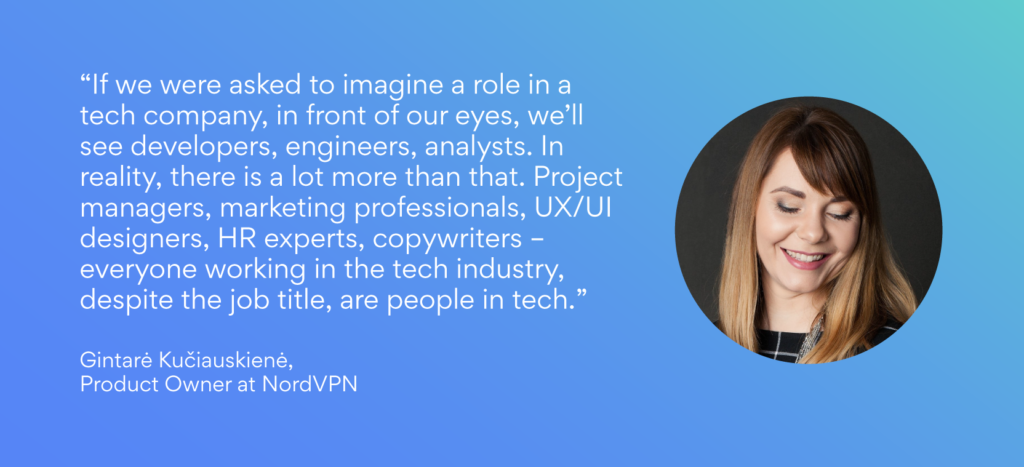
Tech for non-techies
The truth is that you don’t necessarily need to be technical to work in tech. Apparently, 43% of roles advertised by tech companies were non-technical, found a study from Glassdoor.
Gintarė Kučiauskienė, Product Owner at NordVPN, expands on this idea:
“If we were asked to imagine a role in a tech company, in front of our eyes, we’ll see developers, engineers, analysts. In reality, there is a lot more than that. Project managers, marketing professionals, UX/UI designers, HR experts, copywriters – everyone working in the tech industry, despite the job title, are people in tech.”
Toma Jonuškaitė is one such example, holding an Employer Brand Manager role at Nord Security. She’s one of the key people shaping and promoting the company’s image as a desirable place to work. Despite not having a technical background, her career path has always been intertwined with it:
“I started my career as a business journalist, focusing on tech and automotive sectors (e.g., doing new car test drives). Later on, I switched to communications, public relations, and marketing. My experiences spanned from managing events in the gaming industry, including international conferences like Gamescom and GDC, to launching innovative products across the Baltics tobacco industry.”
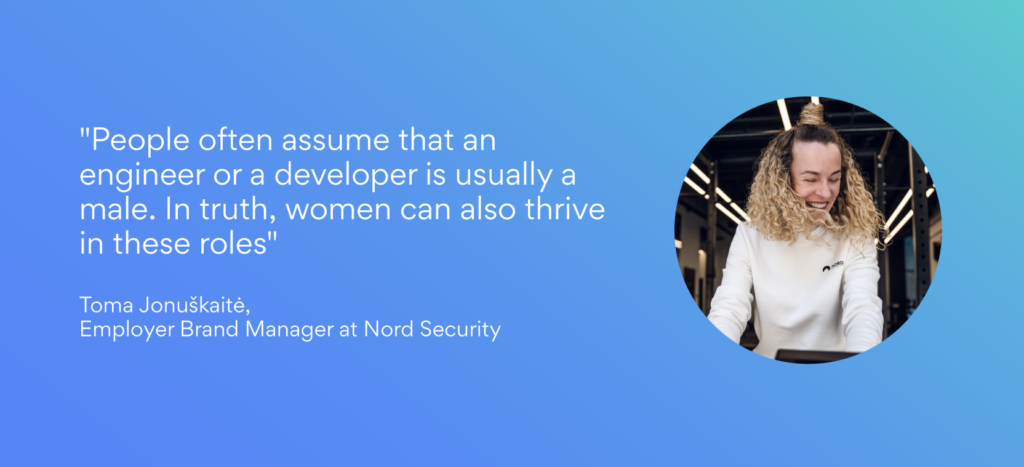
There are way more roles for women looking to make their mark in the tech industry without needing deep tech knowledge, from sales, legal, and administration to design, marketing, risk, and more.
In addition, numerous strategic roles demand not just a grasp of technology but also a strong set of interpersonal skills. Our Information Security Manager, Sigita Jurkynaitė, underscores the importance of communication and teamwork.
“I work closely with diverse teams to maintain the highest international security standards. This role heavily involves maintaining info security documentation and refining processes. While these tasks may appear mundane, they are crucial for ensuring that what’s on paper works well in reality. This involves effective communication with colleagues across various departments, from HR and software development to communications and IT administration, ensuring our strategies are successfully implemented. This role gives me a unique chance to deeply understand our company and drive meaningful improvements in our security posture.”
Sigita also highlights that her position allows room for creativity, particularly in designing security awareness and training initiatives. “I love that I can let my imagination run wild, developing engaging and original content that strengthens our security culture.”
In essence, the tech industry offers a place for everyone, man and woman, with technical backgrounds or without, to innovate, create, and make a lasting impact in the industry.
Women powering the tech industry forward
The tech industry’s vast job opportunities and attractive pay packages are compelling reasons for women to explore careers in IT. Beyond these advantages, women’s involvement significantly propels the industry forward.
- Bridging the talent gap
With cybersecurity alone reporting more than 36,000 open positions in the public sector and more than 700,000 available jobs in the private sector globally, the tech industry faces a pronounced talent shortage. “We’re facing a huge gender gap in technology, and one of the reasons why – is that the importance of inclusion is often overlooked,” emphasizes Sigita Jurkynaitė, Information Security Manager. She underscores that embracing diversity is crucial in seeking to close this gap.
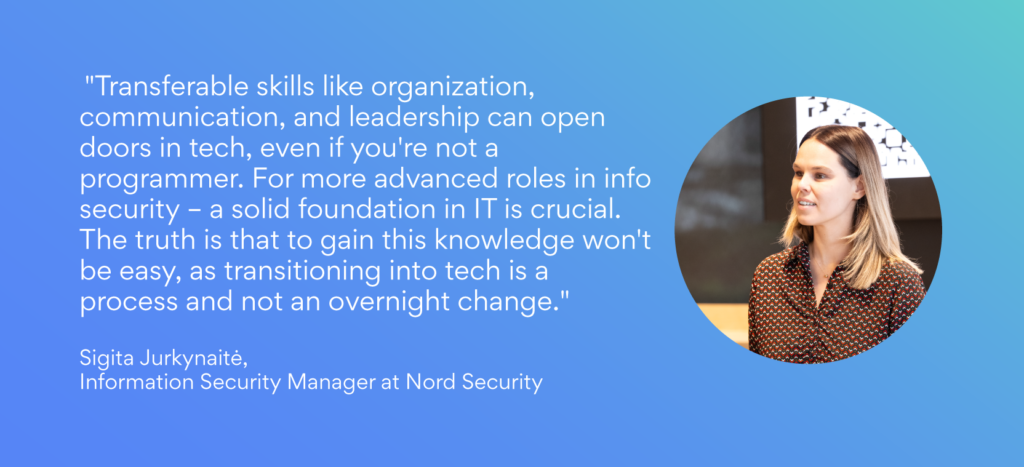
According to McKinsey research, that could become a reality. If Europe could achieve a 45% female workforce in the tech sector by 2027, it could bridge the talent shortage and potentially increase European GDP by up to €600 billion.
- Driving innovation
Diverse teams are proven to be more innovative, reveals the Harvard Business Review study.
Rima Miselytė, a Solutions Architect at NordPass Engineering, highlights the value of women in engineering, coding, and cybersecurity in crafting better solutions and software. Gintarė Kučiauskienė from NordVPN adds that products designed by diverse teams are more capable of addressing the varied pain points of a broad demographic, including users with special needs, underscoring the tangible benefits of diversity in creating universally accessible technology.
- Boosting performance
Increased innovation creates growth in revenue and performance. Research from McKinsey found that, on average, organizations that prioritized gender diversity in their executive teams outperformed their competitors by 20% in terms of profitability.
- Enhancing talent attraction and retention
Organizations fostering inclusive culture find it easier to recruit a more diverse staff. As a result, they have a 22% lower turnover rate, finds Deloitte. Additionally, women in executive roles are more likely to hire other women, enhancing the visibility of females in tech positions and inspiring their peers to pursue similar paths.
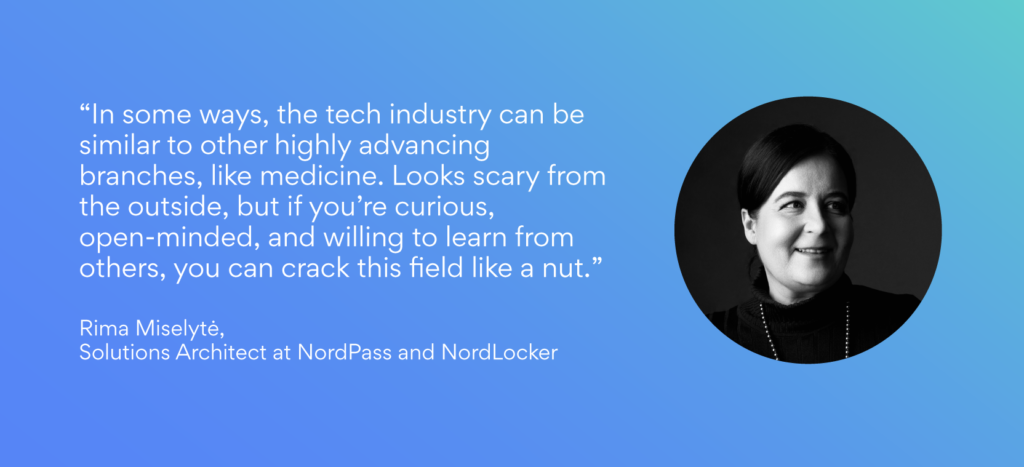
Rima Miselytė, Solutions Architect at NordPass, agrees with this, saying that her colleagues in tech had a huge impact on her career:
“I’ve been lucky enough to have teammates who taught me confidence in my abilities and helped me to find my way in the tech industry (even if that forced me to get out of my comfort zone). At Nord Security, we also have plenty of successful women at all levels, from dedicated employees to great leaders, who actively lead and help grow by their determination and passion.”
How to get into tech?
Aside from those who have completed four-year degrees in IT, there are other pathways you can take when changing careers and getting into tech. To help you get there, we have listed some of the ways you can explore:
- Identify your desired tech role
Dedicate time to exploring and comprehending the various roles within the tech industry. If a particular career sparks your excitement or passion, prepare to put in the effort. “Be curious, open-minded, and willing to learn from others,” advises Rima Miselytė, Solutions Architect at NordPass.
- Find out the needed skills
Our Information Security Manager, Sigita Jurkynaitė, suggests beginning with finding the skills that are necessary for your desired role. They can be transferable (a core set of skills and abilities that go beyond a particular role) and specific, non-transferable skills unique to a domain. Typically, they’re outlined in job ads.
For those eyeing a career in information security, Sigita outlines a skills matrix useful for the field:
“Transferable skills like organization, communication, and leadership can open doors in tech, even if you’re not a programmer. For more advanced roles in info security – a solid foundation in IT is crucial. The truth is that to gain this knowledge won’t be easy, as transitioning into tech is a process and not an overnight change.”
